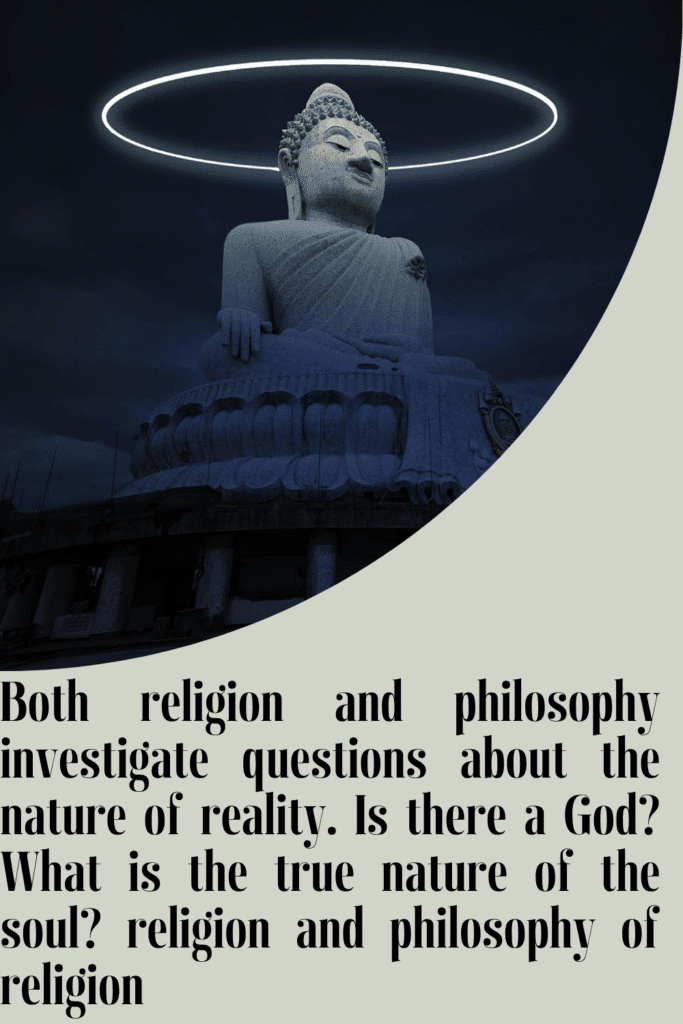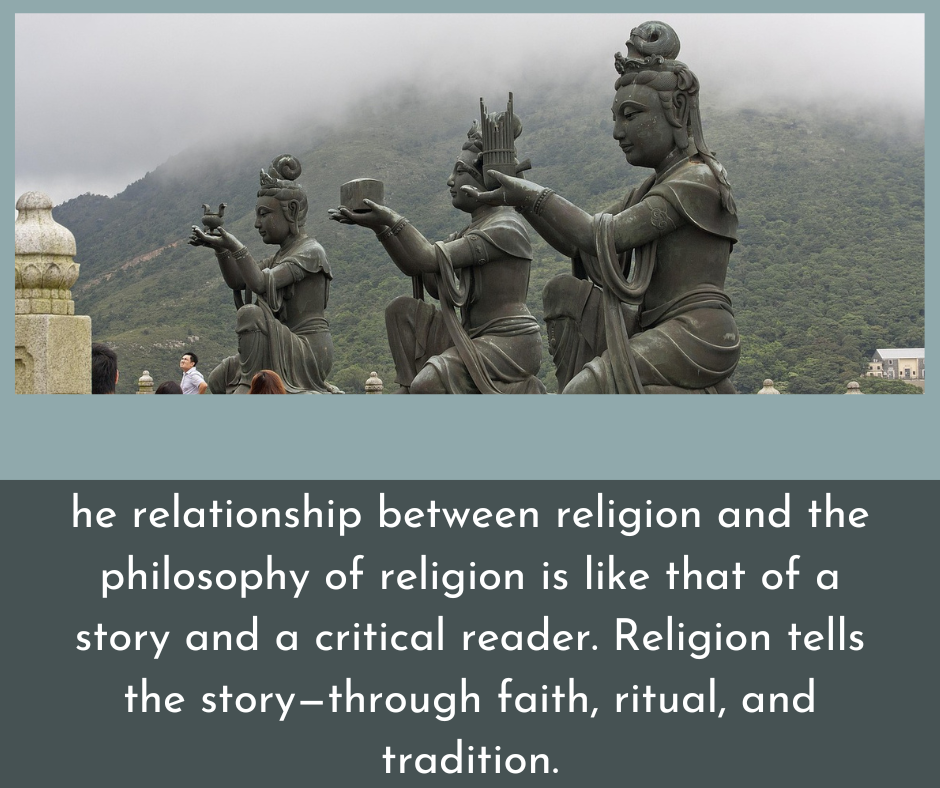Religion and philosophy of religion, Religion and philosophy are two of the oldest ways people have tried to understand life, the universe, and our place in it. Both involve deep thinking, reflection, and big questions. But while religion often relies on faith, tradition, and revelation, philosophy uses reason and critical thinking. When the two come together, we get what’s called the philosophy of religion—a unique field that explores religious ideas using logic and analysis.

What is the precise connection between religion and the philosophy of religion? Are they the same? Are they in conflict, or do they work together? In this article, we’ll break down these questions, examine how these two areas interact, and explore why their relationship matters.
Table of Contents
What Is Religion?
Before we talk about their relationship, we need to understand what religion is.
Religion is a set of beliefs and practices centered on questions of ultimate meaning—such as the purpose of life, the existence of God (or gods), what happens after death, and the nature of good and evil. Religions often include:
- Belief in a divine or sacred reality (like God, Brahman, or the Tao)
- Sacred texts and traditions
- Rituals and moral codes
- Worship and prayer
- Community and spiritual leadership
Religions often depend on faith, spiritual experience, and divine revelation. People may follow religion not only for belief but also for identity, tradition, and a connection to the sacred.
What Is the Philosophy of Religion?
The philosophy of religion is a branch of philosophy that analyzes religious ideas using reason and logical thinking. It doesn’t assume religious beliefs are true; instead, religion and philosophy of religion,it asks whether they make sense, whether they can be supported with evidence, and how they relate to human experience and knowledge.
Some significant inquiries that the philosophy of religion explores include:
• Does a divine being exist?
• Is it possible to provide evidence for or against the presence of a higher power?
• What is the essence of God? Is God omnipotent, omniscient, and benevolent?
• If God is good, why do evil and suffering exist in the world?
• What is the connection between faith and logic?
• Can we rely on religious experiences as credible?
• Is any one religion more accurate than the others?
Philosophers of religion come from many backgrounds—some are religious, some are agnostic or atheist. The goal is not to promote or attack religion, but to understand and evaluate it with clear thinking.
The Historical Relationship between Religion and Philosophy
The relationship between religion and philosophy goes back thousands of years. Many of the world’s greatest religious thinkers were also philosophers. For example:
- Plato and Aristotle (ancient Greece) asked questions about the nature of the divine and the soul, laying the groundwork for later Christian and Islamic thought.
- St. Augustine and St. Thomas Aquinas (Christianity) combined Greek philosophy with Christian theology to explore God, sin, and salvation.
- Avicenna (Ibn Sina) and Averroes (Ibn Rushd) (Islam) used reason to defend and develop Islamic beliefs.
- Adi Shankaracharya and Ramanuja (Hinduism) used logic and debate to explain the nature of Brahman and the self (Atman).
- The Buddha taught ideas that later inspired deep philosophical reflection on suffering, the mind, and reality.
In many traditions, philosophy was not separate from religion—it was a tool used to deepen religious understanding.
Where They Overlap
Religion and the philosophy of religion intersect in various domains:
1. Metaphysics (the study of reality)
Both religion and philosophy investigate questions about the nature of reality. Is there a God? What is the true nature of the soul? religion and philosophy of religion,What is the basic reality that supports the universe? Religion may offer answers based on sacred writings, while philosophy scrutinizes the logical consistency of those answers.

2. Ethics (the study of right and wrong)
Many religions teach people how to live morally. Philosophers of religion study whether moral laws come from God, whether religion is necessary for morality, and whether divine commands are always right.
3. Epistemology (the study of knowledge)
How do we know what is true? Religion often claims that divine revelation or scripture is a source of truth. Philosophers of religion ask: Can we trust these sources? Is faith a form of knowledge?
4. Existential questions
Both religion and philosophy explore the meaning of life, death, suffering, and the search for peace. Religion gives spiritual answers; philosophy of religion examines how those answers hold up under scrutiny.
Differences between Religion and Philosophy of Religion
Despite their connections, religion and philosophy of religion are not the same:
Religion Philosophy of Religion Grounded in faith, customs, and spiritual experiences Grounded in logic, reasoning, and critical analysis Includes worship, rituals, and communal activities Includes examination, discussion, and argumentation Considers certain beliefs as sacred and unchangeable Critiques all beliefs, including those related to religion Seeks to establish a connection with the divine Seeks to comprehend religious beliefs themselves
Can They Work Together?
Yes—and they often do. Many religious people use the tools of philosophy to understand their beliefs better. For example, they may use logic to defend the existence of God or to explain why faith is reasonable. religion and philosophy of religion,This is known as apologetics—a rational defense of faith.
At the same time, philosophy of religion can benefit from insights within religion. Spiritual experiences, sacred texts, and long-standing traditions can offer rich material for philosophical reflection.
So, rather than being enemies, religion and philosophy of religion can work together. Religion provides deep, personal, and cultural insights. Philosophy offers clear thinking and tools to evaluate those insights.
Criticism and Tension
Of course, the relationship isn’t always peaceful. Some religious believers may feel that philosophy questions sacred truths too much, weakening faith. religion and philosophy of religion,On the other hand, some philosophers criticize religion for being based on blind faith or for being resistant to change.
This tension is part of a long debate:
- Can you prove God exists?
- Is religious faith rational or emotional?
- Does religion explain the world better than science?
The philosophy of religion doesn’t avoid these hard questions. Its job is not to protect beliefs but to explore them—fairly, deeply, and honestly.
Why This Relationship Matters Today
In our modern, diverse world, understanding the relationship between religion and philosophy is more important than ever:
- It encourages respectful dialogue between believers and non-believers.
- It helps young people explore their beliefs with depth and clarity.
- It supports religious communities in facing ethical challenges, like artificial intelligence, climate change, and social justice.
It connects the divide between science and spirituality, as well as tradition and advancement.
By blending faith and reason, the philosophy of religion helps humanity explore the deepest questions of existence with both heart and mind.
Conclusion
The relationship between religion and the philosophy of religion is like that of a story and a critical reader. Religion tells the story—through faith, ritual, and tradition. religion and philosophy of religion,The philosophy of religion reads that story carefully, asking: Does this make sense? What does it mean? How should we respond?
While they may seem different, they are deeply connected. Religion gives us purpose and connection. Philosophy of religion helps us reflect and grow. Together, they invite us into a lifelong journey of discovery—one that blends belief, thought, and the endless search for truth.